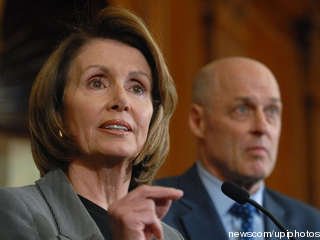
Exclusive from Talking Points Memo:
By Brian Beutler
Nearly two years after the Wall Street meltdown drove the U.S. economy to the brink of collapse, and forced the U.S. government to prop up major financial institutions with hundreds of billions of dollars, House Speaker Nancy Pelosi now claims that the Bush Administration prohibited its own top officials who were handling the emerging crisis from briefing Congress until a complete financial collapse was only hours away.
In little-noticed statements to reporters over the last few weeks, Pelosi has alleged that the Bush administration knew well in advance of its intervention that the financial crisis would hit, and that Congress would need to authorize a historic and unpopular bailout – but that top officials, including then-Treasury Secretary Henry Paulson, told her that they had been barred from briefing Congress about true extent of the crisis.
If accurate, the allegation could constitute a major indictment of the Bush administration, which may have worsened the crisis and resulting economic fallout by delaying the call for congressional action. Pelosi says the admissions from Bush administration officials that they had kept Congress in the dark came in private conversations between her and those officials in person and by phone. None of the other parties to those conversations would comment for this story. Nor is it clear if the Administration’s alleged decision not to brief Congress earlier was a calculated strategy to avoid spooking the already shaky financial markets thus hastening the crisis or, as Pelosi suggests, a political calculation in advance of the 2008 presidential elections, or a combination of the two.
During her weekly press conference on April 15, a reporter asked Pelosi a seemingly innocuous question about taxes. Pelosi prefaced her response with a fairly standard litany: explaining the dire state of the U.S. economy inherited by President Obama and setting the blame at the foot of the Bush administration. But she also added this: “When [then-Senator Obama] accepted the nomination in Colorado, the [Bush] Administration had kept from the public the idea that, in a matter of weeks, the financial community would be in crisis, and we would need to pass the TARP legislation.”
Much has been written about the days, weeks, and months leading up to the financial crisis, which culminated with Lehman Brothers declaring bankruptcy on September 14, 2008. We know, for instance, that Treasury officials in the Bush administration had conceived of a contingency plan along the lines of the TARP bailout months before they actually called for one: a “break the glass” Bank Recapitalization Plan. And it was no secret to anybody paying attention that the financial system had suffered major shocks throughout 2008. But Pelosi appeared to be saying that Paulson and others knew that the glass would have to be broken weeks before they begged her and other congressional leaders to step in.
To clarify, I followed up with her after that press conference.
Pelosi affirmed my interpretation of what she’d said.
She recounted to me the events of September 18, 2008 – some two weeks, she reminded me, after Barack Obama accepted the Democratic Presidential nomination in Denver. Lehman Brothers had just filed for bankruptcy four days earlier and the Federal Reserve had authorized the New York Fed to lend up to $85 billion to insurance giant AIG. That afternoon, she called Paulson to ask for a full briefing the next morning.
“They said, ‘That will be too late. That will be too late. Tomorrow morning, 9 o’clock will be too late,'” Pelosi recalled.
In a meeting that evening with Congressional leaders and staff, Paulson, Fed Chairman Ben Bernanke, and others offered a dire assessment, and made an appeal for intervention that ultimately resulted in TARP. Bernanke and Paulson beseeched the legislators to act quickly, warning that, the entire U.S. economy might collapse in days without rapid intervention. But Pelosi had a question. “I asked them, and said, ‘Why am I calling you – why didn’t you call me?,” Pelosi said.
In our initial conversation, that’s where Pelosi stopped: “You go ask them what their response was to that question.”
Read the rest at exclusive from Talking Points Memo.
ATTENTION READERS
We See The World From All Sides and Want YOU To Be Fully InformedIn fact, intentional disinformation is a disgraceful scourge in media today. So to assuage any possible errant incorrect information posted herein, we strongly encourage you to seek corroboration from other non-VT sources before forming an educated opinion.
About VT - Policies & Disclosures - Comment Policy



